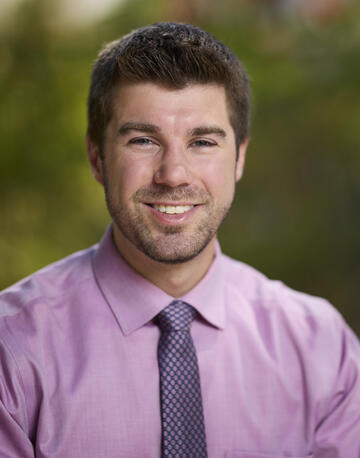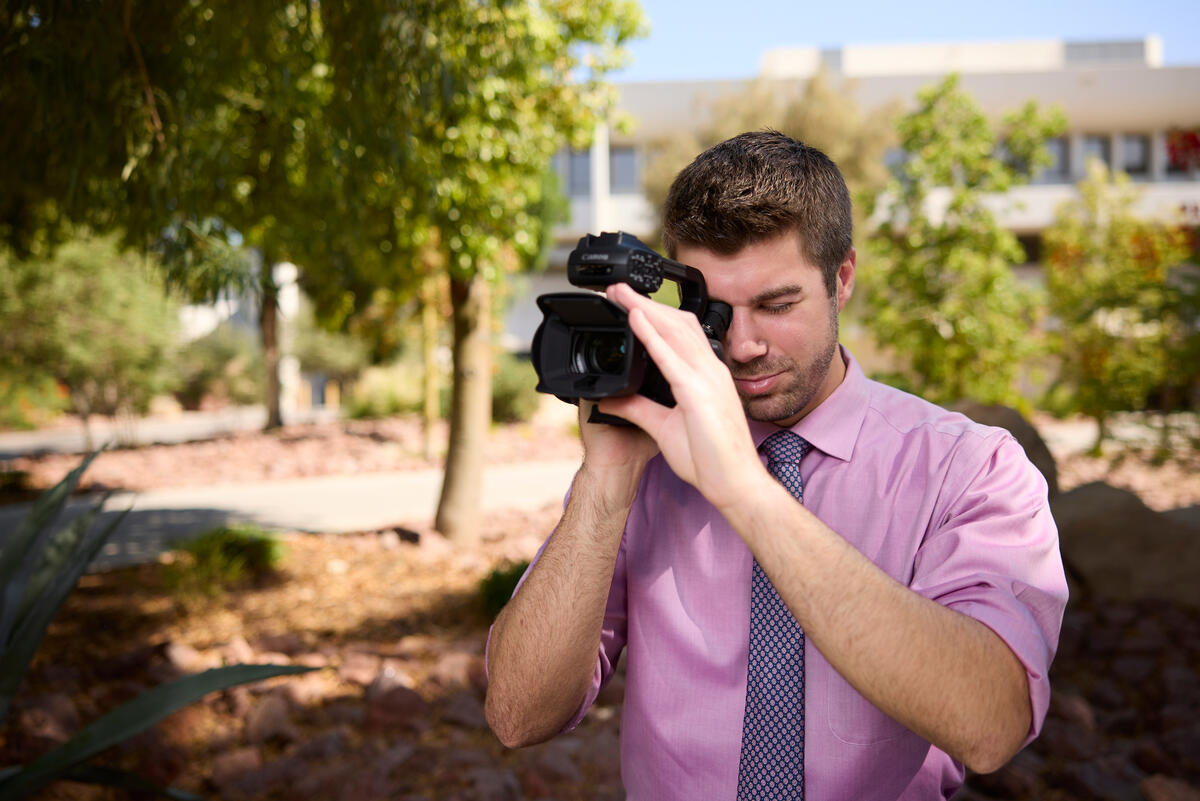When it comes to making UNLV experts look good, you can expect Johnny Domol to have your back. Domol is a media relations specialist in the Division of Integrated Marketing & Branding’s Office of Media Relations. In addition to writing stories for UNLV’s News Center, Domol works with faculty experts, connecting them with local — and even international — media outlets. Before UNLV he was on the receiving side of those pitches as a broadcast journalist.

Domol grew up in Metro Detroit and graduated summa cum laude with a degree in journalism from Wayne State University. His brother is a meteorologist, and Domol says that influenced his decision to enter broadcast journalism. He earned an Emmy and an Edward R. Murrow Award for breaking news coverage of a violent riot in Grand Rapids, Michigan, following the death of George Floyd. He also worked at stations in Georgia, Wisconsin, and Las Vegas before joining UNLV in July 2022.
In addition to reporting, Domol has an equal love of history, particularly WWII and the surrounding time period. It’s an interest that he says is reflected in his news work, where he strives for an objective, documentary style of capturing events and conducting interviews.
In his downtime, Domol enjoys video games and sports that keep him active. But, don’t expect any mercy if you challenge him to ping pong — he’s a self-proclaimed master of the game.
Tell us about your role and what you do here at UNLV.
Long story short, I help the university put its best foot forward. I make sure local or national outlets are aware of our experts and situated for their stories. Additionally, a large part of my role involves storytelling with articles and videography that feature students and faculty.
How much of your job is pitching to the media vs. them reaching out about UNLV?
It's pretty split. They're not going to know about your people unless you're sending out pitches. Not all of them are going to land, but you're hopeful that they tuck the info away for another story, another day. If they have everyone that they need for this story, maybe they won't for the next one, and then they'll call upon the person that you had pitched.
We’re planting seeds. We're sending out the information: “Hey, this guy’s a whiz in XYZ; he’d be cool for this topic you’re working on.” You can’t control what happens next, but you can make it as tempting of an offer as possible.
What inspired you to go into journalism?
I've always had an interest in writing and figured I’d follow the adage, “Do what you love, and you won’t have to work a day in your life.” And technology is a lifelong interest of mine, so if I could somehow align myself on the path of becoming a tech reporter, I thought that would be ideal.
My journey through journalism came to academic fruition during a criminal justice class of mine. A term paper was assigned, everyone let out a collective sigh, and I just shrugged. It didn’t annoy me because I didn’t mind writing, and so I decided to pursue journalism the next semester. The "tech reporter" part went to the wayside, but I enjoyed where I was.
Tell us about what it was like to be a TV reporter.
TV reporters today are typically asked to do it all. You have to produce, shoot and edit video, write articles, be your own IT person – the list goes on. You're doing everything. And in order to move up the ladder, you normally have to move around the country. This took me to Georgia, Wisconsin, Michigan, and finally Nevada.
I eventually realized my career path had to change because it was a constant uphill battle, and I needed a better work-life balance. Broadcast journalism gave me opportunities to see the country, talk to a wide range of characters, and develop a unique skill set that I continue to carry with me every day.
What types of stories did you cover?
I reported on every beat and type of story, from crime to sports. Notably, I’ve covered the Masters golf tournament from Augusta National, spent a weekend in basic training at Fort McCoy, and was at the manufacturing site the morning the Pfizer COVID-19 vaccine was first rolled out.
Some of my personal favorites were the opportunities I had to interview WWII veterans, show off my history knowledge with WWII weapon exhibitions, and do live segments that allowed me to inject some humor. I reported on a lot of events of both national and global importance, and sometimes lose sight of how lucky I am to have had some of those experiences.
You won an Emmy. Can you share the story behind that?
That was for my breaking news coverage of a riot that broke out in Grand Rapids, Michigan, during the summer of 2020. It was a very turbulent year ahead of another presidential election cycle. The COVID lockdown was going on, and people had a lot of pent-up frustrations.
I started my 17-hour day covering protests in Kalamazoo. While those started to fade by the evening, the protests in Grand Rapids continued to grow. I kept requesting and fighting for the opportunity to go up north to Grand Rapids so I could continue reporting on the unrest happening there. Then, I was given the green light.
I got tear gassed in my first live segment moments after arriving, gathered myself, and kept going for another few hours into the morning. It was insane. You hear horror stories about those riots that took place all over the country, and I found myself in the middle of one. There were bricks being thrown, flaming police vehicles, vandalization, looting, screaming, loud bangs, tear gas, beatings. It felt like a warzone. It was utter chaos and one of the most dangerous events I’ve covered.
Because of that coverage, I won an Emmy and an Edward R. Murrow Award. I had earned the top accolades of my field. I am particularly proud of my entire body of work in 2020, as I played a critical role in one of the most impactful years possible in modern journalism.
How does your experience as a reporter affect how you work with reporters now?
I know what reporters are looking for. I’ve received so many press releases from so many companies during my time in the field. You see enough of those, and you get an idea for how they should look and be presented. I remember what clicked with stations as a reporter. I have an idea of what is attractive to a news outlet, so that is a benefit for me.
What is your favorite part of working in media relations at UNLV?
Not too far removed from journalism, my favorite part has to do with the completion of any project. It’s satisfying to hit the “publish” button and walk away with some newfound knowledge on a topic.
If you had a chance to record or document any moment throughout all of history, what would you choose to observe?
If safety is guaranteed and I’m essentially a fly on the wall, both invincible and invisible, that changes my answer. I’d say WWII battlefields such as Stalingrad. The Normandy Campaign. The battles and military formations in North Africa or the Pacific. Personally observing it and not having to lean on reference material from black-and-white documentaries, or firsthand accounts or books where you have to envision or imagine it — to actually see the history I’ve been taught to revere — would be unfathomable.
What are some of your hobbies?
I enjoy video games, tinkering with computers, golf, tennis, ping pong, swimming, and exercising. A little all over the place with those, but it’s what I do.
What's your favorite video game?
There are too many. Resident Evil 4, Final Fantasy VII, Animal Crossing, Mario Kart, Uncharted – I play everything.
Is there something people would be surprised to learn about you?
Low-key, one of my favorite movies is The Devil Wears Prada.
Name your three favorite things you like about Las Vegas.
- Staycations. We live in a vacation destination, so I enjoy staying at the resorts when I have the chance. I most recently stayed at Fontainebleau, and that’s my personal favorite right now.
- Eating. A couple of my favorites on the Strip? Don’s Prime at Fontainebleau, Top of the World at the Strat, and Heritage at the Mirage (thanks for the memories). My overall favorite outside the Strip is China Mama. Nothing hits quite like the crispy beef, orange chicken, and “Mama’s Special” fried rice.
- Weather. I grew up in a barbarically cold climate that is overcast much of the year. I enjoy being able to live in a place where it's warm the majority of the time – no sunny day goes unappreciated. Plus, all outdoor activities are pretty much available year round.
What news headline would best sum up your life or work up to this point?
Oh, boy. I don’t think any newspaper is big enough to fit that one. Maybe “Seen A Lot, Done A Lot, That’s the Best I’ve Got”?



